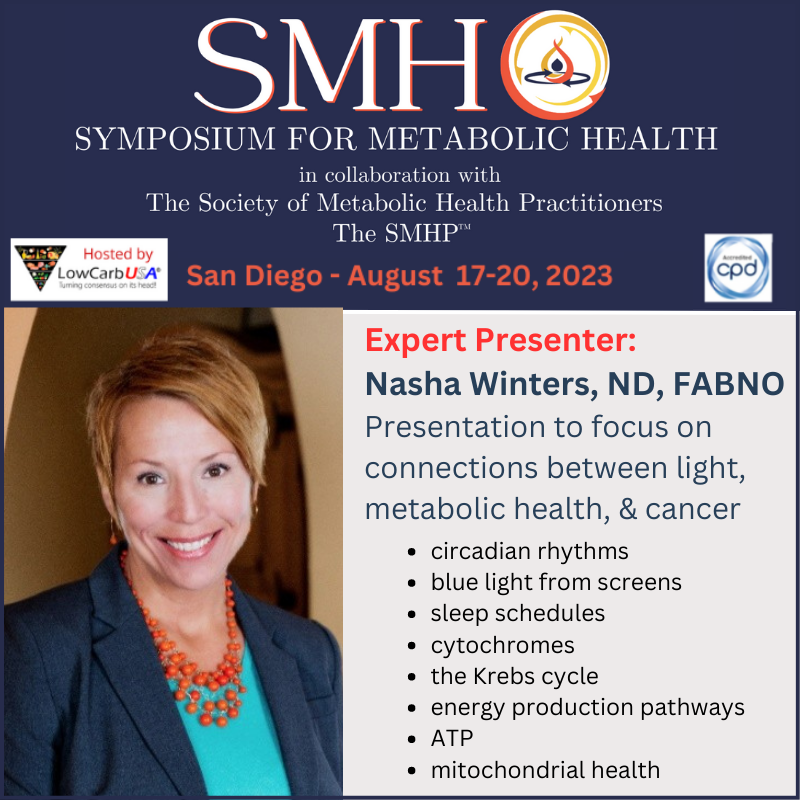Author, Researcher & Expert in Integrative Cancer Care to Speak at 8th Annual SMH Conference August 17-20
Dr. Nasha Winters, ND, FABNO, has been a popular expert presenter at Low Carb USA Symposiums in the past, and we are enthusiastic to announce she will be participating once again in the upcoming 8th Annual Symposium for Metabolic Health (SMH) – San Diego, to be held August 17-20, 2023.
Dr. Nasha is a global healthcare authority and best-selling author in integrative cancer care, and she has consulted with physicians around the world. She has educated hundreds of professionals in the clinical use of metabolic therapy and its foundational place within integrative cancer care, and she has created robust educational programs for both healthcare institutions and the public on incorporating vetted integrative therapies in cancer care to enhance outcomes.
Dr. Nasha has been on a personal journey with cancer for the last 27 years. Her quest to save her own life has transformed into a mission to support others on a similar journey. Her books, written to raise awareness, The Metabolic Approach to Cancer and Mistletoe and the Emerging Future of Integrative Oncology have had a tremendous impact on the lives of those looking for options aimed at prevention and ongoing treatment of cancer.

This year’s San Diego Symposium will feature a special session dedicated to presentations regarding the connection between cancer and metabolic disease, and will educate practitioners and laypersons about metabolic therapies that may improve outcomes in conjunction with traditional treatments.
Dr. Nasha will be one of the presenters in that special session, and plans to devote her presentation to the connections between light, metabolic health, and cancer this year.
Dr. Nasha has long been a strong proponent of a therapeutic diet to improve metabolic health and lower the risk of cancer while improving outcomes, but her presentation this year will address other important factors, including circadian rhythms, blue light from screens, sleep schedules, and much more.
“We get so caught up in food that we overlook some of the key drivers of metabolic health or disease,” said Dr. Nasha, “Light is at the top of that list. We will be having a lively discussion about humans as light sensing beings, and how we can create, or destroy, our health based on exposure and interplay with various wavelengths of light.”
Dr Nasha went on to explain that as a society, we have drifted far from the way of life that existed before the invention of the electric light bulb in the late 1800s.
“We have become more and more indoor creatures,” she said, “to the point where the average American is outdoors for less than 15 minutes a day. And we have become consumed by screen time. We’re spending an average of eight to 12 hours a day in front of a screen, phone, computer, or television. And these have drastically altered the sensing of light into our mitochondria and the behavior, effectiveness and efficiency of our mitochondrial health, which then leads to a wide range of conditions, but in particular, ones very, very specific to the cancer world.”
Dr. Nasha will speak about the science behind why these changes to our daily lives are having such a profound effect on our health, and she will discuss cytochromes, the Krebs cycle and the energy production pathways, ATP, and the importance of mitochondrial health, and much more. She also plans to discuss the importance of photobiomodulation therapy (PBMT) and photodynamic therapy (PDT) in the treatment of cancer.
“I will also talk about things like melatonin, which itself is incredibly useful in the treatment of cancer, not just in the support of and prevention of cancer. And I will be speaking about compelling studies that have come suggesting when we eat is likely as important if not more so than what we eat.”
The Value of the Conferences and the Metabolic Health Community
“The LowCarbUSA® community is a beautiful and incredibly welcoming community,” said Dr. Nasha, “and it has opened up an even larger community to me, which has been great because I’ve had the opportunity to see what else is happening outside of my bubble of cancer treatment and research. I have been able to see what was happening in areas like dementia, cardiovascular disease, diabetes, and nutrition in general.”
“The people who attend these conferences appreciate the relationships and the friendships,” she added. “Patients and doctors have gotten inspired and we’re seeing more and more, a unified front to change the narrative of healthcare, globally. It’s an honor to be part of this community and I’m inspired by it every day.”
Epidemic of Metabolic Disease and Obesity
Dr. Nasha expressed her concern for the fast declining health of Americans, along with their counterparts across the globe.
“The Chapel Hill, North Carolina study that came out in 2018 showed that less than 12% of Americans are metabolically healthy and that is getting even worse,” she said. “Studies suggest that less than 6 to 8 percent of us are actually metabolically healthy.”
“Folks have to take a drug for lipids, a drug for blood pressure, a drug for blood sugar, and they don’t exercise or move their body… the writing is on the wall. The top four or five cancers are all metabolic based, so cancer is going to outpace deaths from cardiovascular disease within the next few years. Globally, the World Health Organization says cancer rates will double by 2030. Diabetes, Alzheimer’s, cardiovascular disease, and cancer are the major takers of life today. And those are all very metabolic in nature.”
Dr. Nasha believes it’s important to continue working to communicate a clear message about the importance of metabolic health, and empower individuals to take control of their health.
“We need to make our message and our approaches crystal clear,” she said, “in order to outpace the misinformation that exists. And we really need to give patients the ability to assess their own metabolic health, and to take charge of themselves and recognize they’re far more powerful than they’ve been led to believe. Ultimately, we have to change everything, from our food supply to our education to our medical system to our insurance system.”
Therapeutic Carbohydrate Reduction
“What’s really overwhelming is we are so brainwashed and confused and misinformed as to what is a truly carbohydrate restricted diet, a normal carbohydrate intake, that no one even knows how to have these conversations,” said Dr. Nasha. “You have an entire industry that trains nutritionists to maintain the industrial machine. A patient who thinks they’re eating low or normal carbohydrates is literally having three days worth of sugar by the end of breakfast.”
8th Annual SMH – San Diego, Aug. 17-20, 2023
Attendees of this year’s Symposium will have the opportunity to learn about the use of carbohydrate reduction in addressing, and even reversing, type 2 diabetes, hypertension, fatty liver, PCOS, CVD, epilepsy, TBI, Alzheimer’s, neurological pathologies, mental health conditions and much more.
This year’s conference will also include a very special session dedicated to presentations regarding the connection between cancer and metabolic disease, and will educate practitioners and laypersons about metabolic therapies that may improve outcomes in addition to traditional treatments, and how they may make them more effective, with less side effects.
For those looking to learn more about the overwhelming evidence supporting carbohydrate reduction as a therapeutic intervention, and how to improve one’s metabolic health through lifestyle changes, the Symposium for Metabolic Health in San Diego will be held August 17-20, 2023.
Save 10% on tickets, low-carb meals, and optional CME credits with code July10 (through July 31st!)


